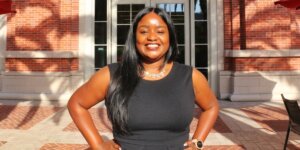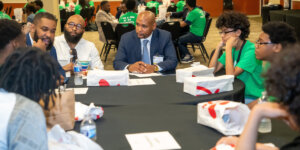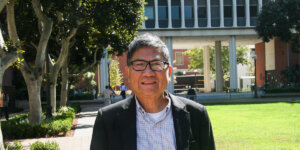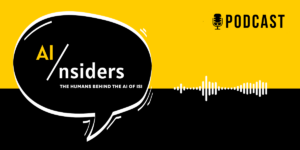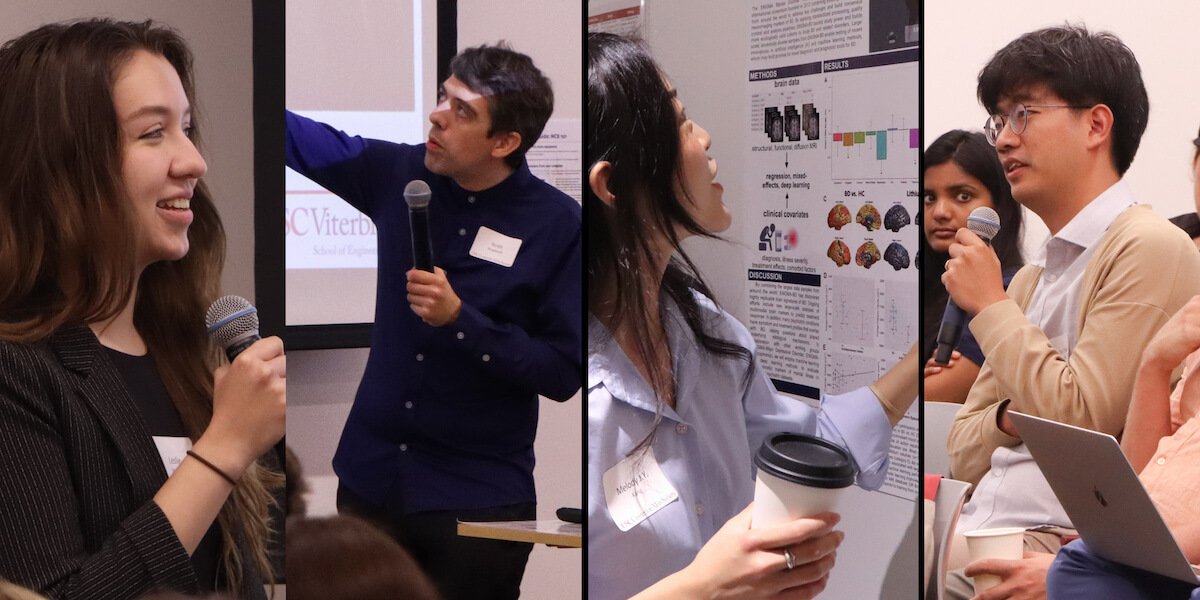
A montage of speakers and attendees at ShowCAIS 2024
In its second year, ShowCAIS, the signature event for The USC Center for AI in Society (CAIS), has rapidly become a melting pot for innovative ideas where artificial intelligence meets social good.
This year’s symposium, which witnessed double the participation from last year’s inaugural gathering, brought together nearly 200 students and faculty members, all unified in their quest to harness AI for the benefit of our society. The April 19 event, which took place on USC’s University Park Campus, brought together researchers from 10 different USC schools to present data-driven, AI-based solutions.
The center, launched in 2016, was one of the first of its kind in the U.S., representing a unique collaboration between the USC Viterbi School of Engineering and the USC Dworak-Peck School of Social Work. Its mission is to advance the research, education, and application of responsible and just AI for the well-being of vulnerable communities through partnerships with community stakeholders, organizations, and policymakers.
“This year was a total success with major growth from last year,” said Bistra Dilkina, a USC Viterbi associate professor and co-director of USC CAIS. “We had an overwhelming response, with many attendees from across USC including undergrads, graduate students, and faculty, as well as a group of homeschool high schoolers, indicating the growing interest and reach of our event.”
The symposium was organized into several critical themes showcasing AI’s potential in sectors ranging from homelessness and environmental sustainability to health and misinformation in the media. Among the innovative approaches discussed were the use of large language models to analyze conversations about homelessness and mental health, remote sensing to map homelessness distribution, and AI-driven neural network models for climate change initiatives like cloud classification. AI’s role in conservation was highlighted by Dilkina, who discussed the pivotal use of AI in environmental protection efforts.

Bistra Dilkina, a USC Viterbi associate professor and co-director of USC CAIS, presents here research on AI’s role in conservation
“AI’s potential in various sectors from the environment to health is profound,” said Dilkina. “The symposium not only highlighted our current capabilities but also catalyzed discussions on future applications, making it a pivotal event for networking and sparking innovative ideas.”
Throughout the event, the emphasis was on ethical AI development and the collaborative efforts across various disciplines and schools at USC. An intriguing presentation by Stephen Gibler, a Hollywood producer and USC School of Cinematic Arts adjunct assistant professor, explored AI’s emerging role in democratizing film production.
His talk, titled “Democratizing Hollywood: Envisioning a Future with Singular AI-Driven Film Creation,” delved into how AI tools could enable individual creators to produce complex films without the need for large budgets. Gibler’s collaboration with CAIS and USC Viterbi underscores the growing synergy between the creative industries and AI technology.
“Collaborating with engineers and AI researchers at USC Viterbi is important and has opened up new possibilities,” said Gibler. “These collaborations are crucial to allow us to push the boundaries of what AI can achieve in creative industries.”
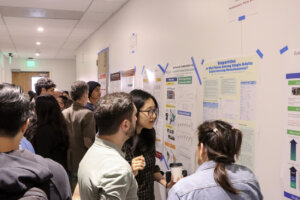
ShowCAIS 2024 attendees engage with research posters at the event
Shaddy Saba, Ph.D. student in the USC Suzanne Dworak-Peck School of Social Work and USC CAIS student leader, shared his work on using machine learning methods to predict increases in pain among veterans with PTSD before graduating this spring. Using data from daily surveys, Saba discovered that recent increases in positive emotions were linked to a decreased likelihood of experiencing pain increases.
“As a student I have really appreciated having ShowCAIS, and CAIS more generally, as a forum to learn about new research approaches that can improve our work with vulnerable populations,” said Saba. “I am really happy with our turnout this year and with the quality of everyone’s work. It was a lot of fun to present, see some familiar faces, and make new connections.”
The event also featured significant student participation, including presentations from student organizations like CAIS++ and posters from 66 different research groups, that included students, staff and faculty, providing an inspiring platform for young researchers to engage with seasoned academics and stakeholders.
Highlighting the event’s focus on practical applications, Grant Brontoli, a USC Viterbi senior in the computer science games program, presented “Sea Guardian: Ocean Rescue.” This web-based educational game teaches middle school students about the ecological role of kelp in marine environments through engaging gameplay where students collect kelp while avoiding ocean toxins.
“By integrating the gameplay with learning goals like these, our goal is to make environmental science engaging and accessible,” said Brontoli. “What’s really exciting is bringing this tool into classrooms and seeing it inspire students. We’re not just teaching them about marine biology or environmental science; we’re showing them how they can make a difference.”
As ShowCAIS 2024 concluded, it was evident that the event had not only showcased the extensive capabilities of AI but also fostered a multidisciplinary approach to education and problem-solving, emphasizing USC CAIS’s commitment to using technology for social improvement. With AI weaving its intricate tapestry across various facets of our lives, events like ShowCAIS not only illuminate its current capabilities but also spark conversations on its future trajectory in creating a more equitable and sustainable world.
“Hopefully, this symposium is seeding some connections that will grow into next year’s presentations and projects,” said Dilkina. “The key to unlocking impact is team science—different perspectives, different backgrounds, different expertise.”
Published on May 2nd, 2024
Last updated on May 16th, 2024





